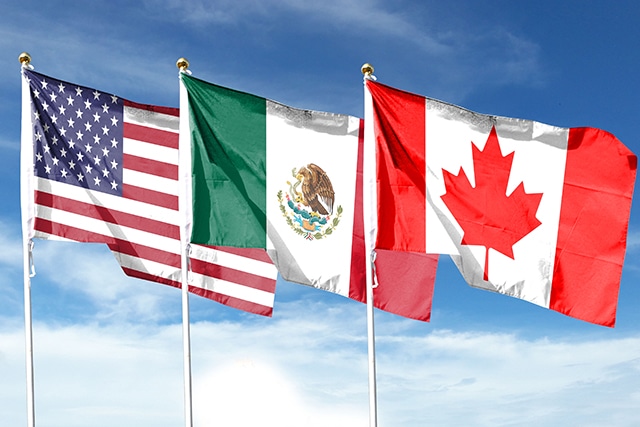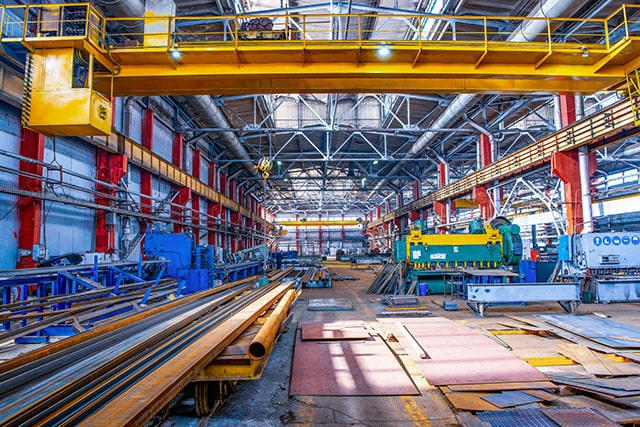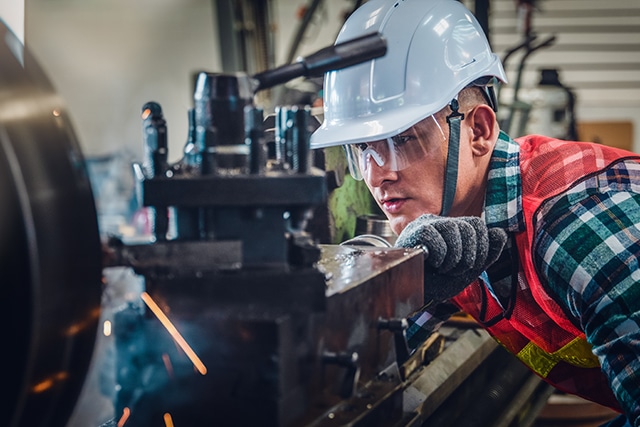 Intellectual property (IP) protection is a concern for any foreign manufacturer. With laws and trade regulations differing from country to country, it’s important to understand that what may protect you in the U.S. may not hold the same weight elsewhere. In fact, concerns regarding China’s failure to protect and enforce IP rights have been one of the key issues between the U.S and China for years.
Intellectual property (IP) protection is a concern for any foreign manufacturer. With laws and trade regulations differing from country to country, it’s important to understand that what may protect you in the U.S. may not hold the same weight elsewhere. In fact, concerns regarding China’s failure to protect and enforce IP rights have been one of the key issues between the U.S and China for years.
Conversely, IP protection for those manufacturing in Mexico has only strengthened over time, particularly with increased commitments addressed in the USMCA. It’s necessary to recognize how crucial IP is to the U.S. economy. Industries that rely on IP support roughly 45 million jobs and 38 percent of the U.S. gross domestic product. As the economy has increasingly moved towards the digital sphere, recognizing and protecting IP has only continued to grow.
In addition to the USMCA and the 11 other free trade agreements Mexico is part of, the country enforces IP protection through a number of agencies, each owning a specific responsibility when it comes to trademark, copyright, and other IP concerns. These government agencies include:
Both the oversight structure and regulations vary from what’s enforceable in the U.S., and it’s up to companies manufacturing in Mexico to understand the differences. Fortunately, a shelter provider shoulders the responsibilities of trade compliance as part of the many services it offers, allowing foreign manufacturers to stay protected when operating under Mexico’s laws.
When the United States, Mexico, and Canada agreed upon a new trade agreement, they updated regulations to meet what’s needed in today’s landscape. The USMCA recently became enforced in July 2020 and highlights several IP rights and enforcement required throughout all three countries.
Chapter 20 of the USMCA covers intellectual property rights and protection at length, highlighting areas such as copyright, trade secrets, and trademarks. It outlines the terms of each provision, specifics of how to ensure effective protection, and how long each protection period lasts. These protocols are in addition to Mexico’s separate IP protection and enforcement.
Understanding intellectual property rights in Mexico can be a complicated matter. However, with the help of an experienced shelter company like IVEMSA, you can begin to understand how different IP laws affect your operation and rest assured that you’re in compliance.
Sources:
https://www.trade.gov/knowledge-product/mexico-trade-agreements
https://www.trade.gov/country-commercial-guides/mexico-protecting-intellectual-property
Among the many advantages of nearshoring to Mexico, particularly when compared to China, is the respect for intellectual property (IP). Trade policy between the U.S. and China has been notoriously shaky over the years, due to the ongoing trade war and the risk associated with IP theft by Chinese companies. According to a 2019 CNBC CFO survey, nearly one-third of North America-based CFOs say they’ve had their IP stolen from Chinese firms at some point over the past decade.

Meanwhile, favorable trade relations between the U.S. and Mexico have been in place since NAFTA and strengthened through the newly enforced United States-Mexico-Canada Agreement (USMCA) in July 2020. The USMCA has the highest standard of any U.S. trade agreement to protect and enforce IP rights. A few of the key highlights as outlined by the Office of the United States Trade Representative (USTR) include:
Under NAFTA, many of these directives were not in place or explicitly detailed. These changes are included with new mandates regarding online piracy and IP protection within a digital environment, which is essential due to rapid innovations in technology in nearly every major manufacturing sector.
Read more: The evolution of Mexico’s intellectual property laws.
IPC president and CEO stated, “The USMCA promises to spur even greater integration among the North American economies and strengthen the region’s stature as a formidable global manufacturing base.”
According to the USTR, the top export categories from Mexico to the U.S. include machinery, electrical machinery, and vehicles. Global management consulting firm McKinsey & Company predicts automotive electronic and software market growth through 2030, increasing from $238 billion to $469 billion, with power electronics reporting an annual growth rate of 15 percent, sensor segments by 8 percent, and electronic control units by 5 percent.
An executive summary published by IBM, detailing a digital transformation in the automotive industry, highlights two key areas where digital IP protection is crucial for the future: connected vehicles and mobility services. The growing number of consumers that expect digital features, such as navigation, security, multimedia, and service diagnostics, to be part of their personal vehicles will lead to product innovation and partnerships between the automotive industry and software, telecommunications, and electronics manufacturers.
Additionally, the trend of mobility services, which provide in-vehicle innovation through smartphone connectivity and integration, which can be moved from vehicle to vehicle, are part of the operational models that guide the new products needed by the automotive industry. Fortunately, the IP protections in place under the USMCA also coincide with the rules of origin laid out in the agreement as well, which requires 75 percent of automotive content to be produced in North America.
The enforcement of the USMCA further incentivizes manufacturers to include Mexico’s nearshore services as part of their strategy. With ongoing research and development necessary to meet evolving consumer expectations, U.S. manufacturers across all sectors will continue to rely on Mexico for the cost-effectiveness and efficiency of its skilled workforce in order to fulfill their production needs during this dynamic era of growth.
As companies decide their best options for expansion, IP protection serves as another factor that pushes Mexico ahead of China in terms of trade relations with the U.S. Although the automotive industry is one of the largest sectors benefiting from the advantages of nearshoring to Mexico, it’s not the only one, since IP protection is essential to all industries, including aerospace, electronics, and medical devices, as technology is developed.
Sources:
https://ustr.gov/sites/default/files/files/Press/fs/USMCA/USMCA_IP.pdf
https://www.ipc.org/news-release/electronics-industry-joins-call-passage-usmca
https://ustr.gov/countries-regions/americas/mexico
https://www.ibm.com/downloads/cas/LVDZDXOA
https://www.trade.gov/knowledge-product/mexico-e-automotive-parts-and-supplies
 Beginning in the early-to-mid ‘90s, the Law of Industrial Property and Federal Copyright Law have covered intellectual property (IP) protection in Mexico. Additionally, U.S. manufacturers have held IP protection under NAFTA with regards to trade with Mexico. Companies will soon experience improvements to these protections through the signed and revised U.S.-Mexico-Canada Agreement or USMCA set to be enforced this year.
Beginning in the early-to-mid ‘90s, the Law of Industrial Property and Federal Copyright Law have covered intellectual property (IP) protection in Mexico. Additionally, U.S. manufacturers have held IP protection under NAFTA with regards to trade with Mexico. Companies will soon experience improvements to these protections through the signed and revised U.S.-Mexico-Canada Agreement or USMCA set to be enforced this year.
When first established, provisions of Mexico’s IP laws initially focused on property rights for inventors. These have now evolved to include the protection of patents, trademarks, trade names, trade secrets, slogans, industrial design, origin identification, and trade names with an emphasis on industrial use cases. As of 2018, Mexico issued updates to its current IP laws to offer even greater protection to businesses.
Among these changes included expanded definitions of design registration law and trademark verbiage to be inclusive of non-visual trademarks. These align with the language of the USMCA trade deal that was signed by all three countries in November of last year and revised the month following.
Entities starting the trademark registration process should expect a timeline of approximately six to eight months in order for the application to be reviewed and accepted under compliance with the country’s set regulations. Approved trademarks in Mexico are valid for ten years from the filing date and can be renewed.
IP protection laws have been modernized to include language and laws protecting digital content and trademarks. As technology and international trade relations continue to expand and evolve, the security of these protections become even more important for all industrial businesses.
When enacted, the USMCA will recognize IP enforcement protocol to include digital property to safeguard data transferred across borders. There are also standards set forth with regards to internet service provider (ISP) protections and updates to trademarks and trade secret provisions.
The revised agreement also sets a new standard for protecting the pirating of digital media, including music, books, and movies. Generally speaking, the USMCA recognizes the importance of specific IP enforcement protocols for copyright or trademark infringements as it pertains to modern classifications of provisions previously outlined.
Mexico’s ever-expanding attention to IP protection, especially in accordance with the trade agreement with the U.S. and Canada, has continued to make it a favorable choice over manufacturing in China where such IP protections do not apply. This advantage, in addition to the ongoing trade war between the U.S. and China, has caused manufacturers to consider moving or at least diversifying their operations to focus on Mexico manufacturing solutions in the near future.
With the enactment of modern laws to include digital protection, new procedures are established to ensure companies have their intellectual property safeguarded. Mexico remains steadfast in enforcing IP protection and limiting infringement through several of the country’s organizations. The Office of the General Attorney, the National Institute of Copyright, and the IMPI (Mexican Institute of Industrial Property) are all agencies that pursue disciplinary action against IP violations.
 For many businesses, their intellectual property is among their most important assets, and it is critical to protect this property, especially when nearshoring in Mexico or manufacturing in other foreign countries. National laws in Mexico are designed to enforce the protection of intellectual property and other technical or proprietary knowledge.
For many businesses, their intellectual property is among their most important assets, and it is critical to protect this property, especially when nearshoring in Mexico or manufacturing in other foreign countries. National laws in Mexico are designed to enforce the protection of intellectual property and other technical or proprietary knowledge.
NAFTA and the new USMCA dictate minimum requirements for intellectual property protection, but the US, Mexico, and Canada have their own laws that exceed these requirements. Mexico’s legal framework, for example, offers express protection for industrial secrets, heavy piracy penalties, and the ability to patent pharmaceuticals.
Here are some basic terms to know about Mexico’s intellectual property laws, as well as the steps businesses can take to protect their intellectual property when manufacturing in Mexico:
A patent can cover any invention, industrial design, or model of an invention and guarantees their exclusive use. Patents in Mexico are authorized by the Patent and Trademark Office and are granted for a set period of time.
The registry is similar to patents but applies directly to utility models or industrial designs.
Mexico’s IP laws don’t strictly define what an invention is, but they do specify things that are not considered inventions, including:
A utility model is an object, tool, device, or utensil that arises from the modification of an existing item. The new object must have more purposes or uses than the original.
An industrial design is any element that is newly created and significantly improves the way of doing any activity. Industrial designs can be drawings or models that are to scale and three-dimensional representations of the new elements.
For businesses looking to obtain patents or register their intellectual property, the process is straightforward. However, it’s important to keep records of all your documentation and be patient.
The IMPI will review all submitted materials and make a determination in about six months.
If you have questions or concerns about protecting your intellectual property in Mexico, working with a shelter provider in Mexico is a great option. Our team can answer all your questions and walk you through the steps needed to register or obtain patents so you can run your manufacturing operations in Mexico with peace of mind. Contact us today to learn more.
Free trade agreements (FTAs) connect manufacturers on a global scale by reducing trade barriers among countries to strengthen production. Mexico has maintained a strong manufacturing presence, upholding 13 FTAs with 50 countries, including the European Free Trade Area, the Comprehensive and Progress Agreement for Trans-Pacific Partnership, and the United States-Mexico-Canada Agreement (USMCA), formerly known as the North American Free Trade Agreement (NAFTA).
Mexico has more FTAs than any other country, which has facilitated economic gains and innovation across various manufacturing sectors around the world. The USMSCA encourages foreign direct investment in Mexico’s manufacturing industry, specifically, and since its enactment, Mexico has become the top trading partner of the U.S. with nearly $798 billion in goods and services exchanged between the two countries.
Each FTA lays out specific terms regarding agreed-upon benefits and requirements. The USMCA focuses on furthering the manufacturing activity within North America’s trade bloc. And, as more U.S. companies consider nearshoring to Mexico, it’s valuable to reassess the benefits the USMCA provides.
For years, the United States, Mexico, and Canada operated under NAFTA before the USMCA officially replaced it in 2020. This enactment was intended to strengthen reciprocal trade practices across North America by including provisions relevant to modern production needs, such as digital trade and intellectual property (IP).
For instance, the trade agreement solidifies commitments to enforce penalties for IP violations to protect manufacturers from patent and copyright infringements. Another key provision of the USMCA is the Rule of Origin.
This requires that 75% of automotive content must be made in North America to qualify for tariff benefits. Per the Office of the United States Trade Representative, this rule:
Furthermore, the USMCA contains a provision regarding labor value and protection. Trade rules require 40-45% of auto content be made by workers earning at least $16 per hour. These rules are intended to encourage more investment by auto companies in research and development in the region.
Also, The Rapid Response Labor Mechanism, an agreement between Mexico and the U.S. only, allows “enforcement actions against individual factories if they fail to comply with domestic freedom of association and collective bargaining laws.”
Though much of what was originally included in NAFTA is still part of the USMCA, there are updates that have created more balanced trade and support the growth of North American economies.
Trade compliance is challenging to navigate when manufacturing in any foreign country. The smallest misstep can result in fines, project delays, or other penalties. To maintain compliance amidst changing FTA regulations, working with a Mexico shelter company helps to minimize risk and liability.
The shelter model protects U.S. and other foreign manufacturers from being legally exposed to Mexico’s authorities. It also maintains the proper permits and certifications to comply with local laws and regulations.
If you’re considering manufacturing in Mexico as a strategy in the coming year, contact IVEMSA to discuss how our shelter services can make the transition seamless.
Sources:
https://www.trade.gov/country-commercial-guides/mexico-trade-agreements
https://www.dol.gov/agencies/ilab/our-work/trade/labor-rights-usmca
https://ustr.gov/sites/default/files/files/agreements/FTA/USMCA/Text/31-Dispute-Settlement.pdf
https://ustr.gov/trade-agreements/free-trade-agreements/united-states-mexico-canada-agreement
The manufacturing industry has had its fair share of ups and downs in recent years, yet the IMMEX program in Mexico has remained relatively steady. Though there are always changes to anticipate, trends are forecasting a positive outlook heading into 2025.
Let’s explore more of what U.S. and other foreign manufacturers can expect when it comes to costs and competition in Mexico.
For manufacturing companies considering expanding to Mexico, costs remain competitive compared to the U.S. and China. And, despite changes in government leadership, the landscape looks stable to move operations.
With average inflation, any adjustments are expected to be similar to those experienced in 2024. Plus, certain cost-saving advantages remain in place, such as the proximity of Mexico to the U.S. audience and the free trade agreements Mexico holds with other countries, particularly the USMCA.
In terms of the flow of commercial trade, infrastructure can always be improved. However, there are tens of thousands of truck crossings and hundreds of millions in bilateral trade every day between the U.S. and Mexico.
Customs are well-integrated to ensure as much efficiency as possible, and this shouldn’t change anytime soon. Furthermore, with established transportation routes and advanced warehouse production, manufacturing in Mexico will continue to be the best cost-competitive solution for the North American market.
Though this year was not as dynamic as 2022 or 2023, the construction of new commercial buildings in Mexico continued strong, and more space became available than in recent years. With the expansion of available facilities, manufacturers will find it easier to negotiate leases and keep costs close to what they were in 2024.
One of the most dependable benefits of manufacturing in Mexico is the availability of a technically skilled workforce with thousands graduating every year from universities and/or technical schools. This year, the unemployment rate has been on the lower end, making room for many job opportunities, which makes recruiting top talent increasingly competitive.
Therefore, U.S. and other foreign manufacturers must establish a strong recruiting process and re-evaluate benefits to fit what is expected by talent in Mexico. These include traditional healthcare and retirement savings benefits, in addition to food coupons and transportation to work, as well as bonuses for punctuality and attendance, and paid vacations (separate from paid time off), as part of a robust compensation package.
Historically, manufacturing in Mexico has always been a cost-effective strategy for U.S. and other foreign manufacturers to expand production. There are two options to get started: establishing a standalone entity or enlisting the experienced support of a shelter company.
Working under a Mexico shelter company is the safest and most efficient way to do business. Plus, it frees up time for manufacturers to fully focus on production while maintaining complete control over all processes and intellectual property rights.
A shelter company also simplifies the transition to manufacturing in Mexico by handling all the administrative responsibilities necessary for setup. This includes site selection, recruiting and hiring employees, managing taxes and accounting, and overseeing trade compliance.
Thinking of diversifying your portfolio to include Mexico in 2025? Contact IVEMSA to discuss how our shelter services can best align with your manufacturing goals.
Source:
https://opendata.sandag.org/stories/s/Border-Crossing-and-Trade/adfp-wjae/
Nearshoring to Mexico has impacted the growth of the global market in several manufacturing sectors, including the medical device industry. Due to the convenient proximity to the U.S. market and an established infrastructure, Mexico continues to be a thriving production hub. 
2024 revenue reports reflect the medical device market in Mexico is expected to reach upwards of $7.96 billion with an anticipated annual growth rate of 5.37% to reach market volume of $10.34 billion by 2029. Among the many reasons for the surge in growth is the improving access to advancements in medical technology driving demand.
With the support of a highly skilled workforce, a reputation for quality, and a reliable supply chain, among other benefits, Mexico continues to be a chosen location for production expansion and increased foreign direct investment. It is already home to many of the top global medical device manufacturing companies in the world, including Medtronic, Stryker, Baxter, Becton Dickinson, and Intuitive Surgical, and continues to support growth in the sector.
For decades, U.S. and other foreign manufacturers have relied on the cost-effectiveness of Mexico’s workforce. However, it’s the availability of technical talent that allows manufacturers to fulfill roles that may otherwise go unfulfilled as the U.S. struggles with recruiting qualified labor.
Many U.S. and other foreign manufacturing companies partner with local universities in Mexico. They set up specific training programs to teach skills required to consistently meet production needs.
Due to Mexico’s proximity to the U.S. market, it’s easier for project managers to provide quality assurance and production oversight compared to manufacturing in China. Also, because of the highly specific nature and requirements necessary for medical device production, recruiting top-level talent ensures fewer mistakes that may delay getting products to market.
The complex logistics of manufacturing in China have caused many manufacturers to diversify their portfolios and expand production to Mexico. U.S. manufacturing companies can import and export more quickly and at a much lesser cost compared to production in China. Plus, a steady supply chain and multiple transportation methods allow manufacturers to choose the best route for them.
Medical device products in Mexico are subject to the same safety regulations as those manufactured in the U.S., under FDA Class I, II, and III guidelines. Additionally, provisions under the USMCA clearly outline protections for intellectual property and penalties for violations for greater manufacturing confidence.
One of the key benefits helping to strengthen the medical device sector is Mexico shelter manufacturing. This unique advantage provides U.S. and other foreign manufacturers with the easiest and safest way to do business.
Working under a shelter model mitigates a manufacturer’s risk and exposure to legal authorities while allowing them to maintain full control over production. Additionally, a Mexico shelter company handles all administrative responsibilities needed to launch production, including site selection, HR and recruiting, and tax and customs compliance.
Implementing shelter services allows manufacturers to launch production in three to four months, which cuts the timeline nearly in half compared to setting up as a standalone entity. Plus, it saves costs on labor, infrastructure, and license fees.
Medical device manufacturing is one of the many sectors experiencing significant growth, which is driving new foreign businesses to set up production in Mexico. To get started as quickly and efficiently as possible, most manufacturers choose to work with a shelter company.
Find out if shelter services are a good fit for your manufacturing company and how you can save time, money, and resources by working with IVEMSA. Contact us today.
Source:
https://www.statista.com/outlook/hmo/medical-technology/medical-devices/mexico
Nearshore manufacturing in Mexico has been a popular way for businesses to expand internationally. The close proximity to the U.S. market has helped to reduce labor costs, transportation fees, and delivery times compared to other countries, particularly China.
However, it’s important for companies to commit to a long-term growth strategy. It’s rare for foreign manufacturers to return and try again if their initial production attempt fails.
Fortunately, Mexico shelter manufacturing offers both long-term and short-term benefits to consider, though to ensure a seamless transition, partnering with a shelter company is the best way to go.
A long-term mindset is necessary to be a strong presence in the market. Mexico provides an excellent opportunity for U.S. and other foreign manufacturers who want to diversify their portfolios and stay close to an American audience. Additional advantages include:
Nearshore manufacturing in Mexico offers several cost-saving benefits, including reduced labor and transportation fees. Manufacturers can also get products to the U.S. market quicker, helping them to stay competitive.
Furthermore, when working with a Mexico shelter company, there’s an infrastructure in place that allows manufacturers to save on permits and license fees, as well as administrative department setup and management.
America is experiencing a shortage of skilled workers qualified for the growing number of manufacturing roles needed. Meanwhile, it’s difficult to oversee the production quality of workers in China.
Alternatively, the steady availability of Mexico’s technical talent has continued to support the growth of global manufacturers across all sectors and job types. Plus, the proximity to the U.S. provides travel convenience for project manager oversight.
Mexico maintains 12 multilateral trade agreements providing preferential trade access with 44 countries. This includes the USMCA, which favors trade between the United States, Mexico, and Canada and institutes requirements regarding original content and intellectual property protection within the trade bloc.
By diversifying a manufacturing portfolio, it reduces the risk of maintaining sole reliance on one production area. Though many manufacturers are moving operations from China to Mexico, others are actively operating in multiple countries to stay agile and competitive.
Though long-term, Mexico shelter manufacturing is a smart investment, there are many short-term benefits manufacturers can experience right away. These are:
The proximity between the U.S. and Mexico allows for shorter wait times compared to China. In some cases, same-day or next-day delivery is possible.
This time savings is further impactful when considering the extraneous transportation costs from China to the U.S., which counteracts any potential cost savings on labor that may apply.
As industrial space becomes more scarce and lease prices go up in the U.S., there’s a better chance of finding a competitive lease in Mexico.
As part of its site selection services, a Mexico shelter company can help narrow down plant options based on budget and production needs, and create a comparison matrix of buildings that will work best.
U.S. and other foreign manufacturers with IMMEX program approval and VAT certification avoid the 16% VAT on all temporarily imported goods, materials, and equipment required for production. Under the shelter model, this benefit is available on day one.
A Mexico shelter company handles all the administrative responsibilities a foreign manufacturing company needs to launch production. It’s the best short-term entry model, as it reduces risk and exposure to legal authorities, though it also has a long-term advantage.
Once there is a better understanding of how Mexico shelter manufacturing works, a shelter company can help manufacturers continue as a standalone entity.
Our team is here to support your short- and long-term production goals and help you experience a seamless transition. Jumpstart your manufacturing success in Mexico by exploring the benefits of working with IVEMSA.
There have been ongoing comparisons between the value of manufacturing in China vs. manufacturing in Mexico. Though each has its own advantages, the final decision isn’t always choosing one over the other but rather diversifying where to expand production.
Manufacturing in Mexico is cost-competitive, yet cost on its own isn’t always the deciding factor when choosing this option over China. The greatest advantage in expansion to Mexico vs. China is the reaction time to the U.S. market and the availability of Mexico shelter services.
Mexico has a proximity advantage that China, nor any other Asian country, can’t compete with. For instance, even if manufacturing in Southeast Asia may be a cheaper place to produce goods, the supply chain is not as reliable for some industrial sectors, and the transportation time and expense overshadow any savings on labor when shipping to the North American market.
Depending on their audience, manufacturers may choose to launch factories in multiple regions, as China is still an attractive option. However, when addressing a U.S. market, specifically, nothing beats the benefits of Mexico manufacturing. Here’s why:
Overseeing production in China comes with a set of challenges that starts with a significant time difference and extensive travel from the U.S. Whereas, manufacturers headquartered in the U.S. can easily travel to their operations within a few hours and with fewer hurdles.
Due to the proximity between the U.S. and Mexico, shipping time and transportation costs are also greatly reduced compared to China manufacturing. This helps to reduce operational delays and allows companies to release products to the U.S. market faster.
Manufacturing in Mexico vs. China also expands the value to the U.S. economy. Most production materials are shipped from the U.S., which supports its suppliers and combines the infrastructure of the two countries. Plus, it provides the opportunity to employ workers who live in the U.S. as well as Mexico to fulfill the required job roles.
Moreover, the free trade agreement between the U.S., Mexico, and Canada (USMCA) has special requirements and incentives regarding regional value content to benefit North American countries. For example, 75% of a vehicle’s content must be made in North America to qualify for tax-free status, and there are established intellectual property protections that China doesn’t offer.
Manufacturers that choose to expand to Mexico have the unique option of partnering with a shelter company. This minimizes the risk and liability of operating in a foreign country for manufacturers since they will not establish a legal presence when operating under a shelter.
Additionally, setting up factories that manufacturers can easily visit and provide oversight is also part of a risk reduction strategy. When there are delays or problems that arise, U.S. manufacturers can travel to production sites in Mexico in a day versus the extensive time, cost, and planning it takes to travel to China.
Furthermore, a Mexico shelter company takes on all administrative responsibilities necessary to launch production so manufacturers can focus their efforts on production and processes. The support and services of a shelter’s local expertise reduce the learning curve and costs, advance start-up time, and allow companies to stay agile as they grow.
While there are still reasons why manufacturers maintain production in China, it makes sense for those targeting the U.S. market to consider expansion to Mexico. And, by choosing Mexico shelter services, manufacturers can experience a speedy and seamless transition and get up and running in three to four months.
Learn more about the benefits of manufacturing in Mexico and how our shelter company can help you be successful. Contact IVEMSA today.
Shelter services in Mexico have become a strategic advantage for U.S. and other foreign manufacturers wanting to leverage the full potential of nearshoring to Mexico. It’s encouraged global brands from various sectors – including automotive, aerospace, and medical device manufacturing – to continue increasing their foreign direct investment, making the U.S. the largest trading partner of Mexico.
Mexico’s shelter program allows foreign companies to conduct business without the risk and liability of setting up their own entity. Therefore, with the support of a shelter company, manufacturers can seamlessly navigate Mexico manufacturing, enabling them to get their production up and running faster.
Additionally, there are several incentives, including tax benefits and duty-free zones, that a shelter company can help manufacturers secure. The availability of shelter services in Mexico has encouraged manufacturing growth over the years and continues to set up U.S. and other foreign manufacturers for success.
Here are key areas where shelter services in Mexico provide the most value:
Mexico wisely invests in its educational institutions and training programs to sustain a steady pool of technical, well-trained talent. This makes it an attractive option for U.S. and other foreign manufacturers seeking to fulfill various roles for production at a lower cost.
One of the primary benefits of implementing shelter services in Mexico is gaining the expertise and networking accessibility for recruiting and retaining industrial labor. Furthermore, manufacturers save on administrative costs necessary for the recruiting process, including HR, payroll, and accounting rather than having to hire these departments separately.
Mexico’s proximity to the U.S. market also makes it a strategic location for production. In addition to recruiting industrial labor, site selection is an essential part of shelter services in Mexico.
A shelter company like IVEMSA creates a site selection matrix which narrows down viable facilities and compares costs between locations. This helps manufacturers secure competitive space and continue with the next steps for production. IVEMSA is then responsible for leasing the facility and all necessary permits and licenses. This helps to expedite setup and achieve a production launch date in as little as three to four months.
Implementing shelter services in Mexico also reduces the learning curve for U.S. and other foreign manufacturers when navigating the complexity of Mexico’s laws and regulations. Plus, a shelter company helps manufacturers benefit from the unique tax advantages offered under Mexico’s IMMEX program.
Approval into the IMMEX program grants manufacturers a 16% VAT exemption for all temporarily imported materials needed for production. Since a shelter company maintains all required permits and licenses, including IMMEX certification, manufacturers working with a shelter automatically receive this benefit, resulting in significant cost savings.
A shelter company handles all administrative responsibilities, which include HR, accounting, daily trade operations, and payroll. Therefore, manufacturers can fully focus on production while also maintaining complete control and ownership over all processes and intellectual property rights.
Moreover, shelter services allow for flexibility to scale up or stop production as needed. Though IVEMSA maintains a 15-year average customer retention rate, manufacturers are free to establish a standalone entity at any time.
Operating in a foreign country comes with its own set of challenges. Therefore, working with a shelter company is the most popular option for U.S. manufacturers new to setting up operations in Mexico.
Learn how our shelter services can benefit you. Contact IVEMSA today.
For decades, American manufacturers have benefited from the low cost of industrial labor and the convenient location Mexico offers to expand their production and meet growth demands. Now, Mexico is also following suit with what the U.S. has imposed on China with regard to duties.
The Mexican government recently announced a modification to its import law with a temporary measure to raise tariffs anywhere from 5% to 50% for 544 HS codes. These trade classifications include steel, aluminum, plastics, and electrical materials, among others.
Enforcement of this increase began on April 23, 2024, and will remain in effect through April 23, 2026. Though this affects imports from non-free trade agreement (FTA) countries, including China, the increase in import duties will not apply to manufactured goods that comply with a certificate of origin due to the USMCA agreement. This benefit also applies to materials and goods coming from countries with free trade agreements with Mexico.
Rather, it further promotes Mexico’s alignment with the U.S. and Canada as part of the USMCA trade bloc. The USMCA allows American manufacturers to benefit from the elimination of tariffs on trade for qualifying goods between the three countries, further incentivizing American manufacturers to expand or relocate production from China to Mexico.
In addition to Mexico imposing additional tariffs for non-FTA countries, the U.S. has continued restricting trade with China, prompting many to move operations to Mexico, thereby helping to close the competitive gap.
China was once the preferred trade partner of the U.S. due to cheap labor costs. However, struggles with supply chains and inflated transportation expenses have caused U.S. manufacturers to consider nearshoring to Mexico instead.
The trade war between the U.S. and China has also gained new momentum. In 2022, due to national security concerns, the U.S. Department of Commerce barred American companies from shipping equipment to Chinese manufacturers producing advanced chips. Rather, the administration encouraged U.S. manufacturers to establish their own opportunities through the CHIPS and Science Act.
The CHIPS Act is intended to strengthen economic growth with investment in regional innovation throughout the country, to help ensure “what’s invented in America is made in America.” As the U.S. tightens up national security by restricting trade with China, it reveals the early stages of what will eventually be a more segregated trading bloc among North American countries.
Fortunately, with the availability of shelter manufacturing services, American operators can set up production in Mexico quickly and efficiently while also maintaining ownership over processes, equipment, and all intellectual property.
Shelter services in Mexico have been a cost-effective strategy for U.S. companies, especially those that no longer wish to partner with China for resources or manufacturing. With an expert team of advisors, a shelter can help American manufacturers set up operations in approximately three to four months compared to the six to seven months it takes to establish a standalone entity.
Shelter manufacturing services include all the administrative departments necessary to set up production in Mexico, such as HR, accounting, and trade compliance, among others. And, for manufacturers transitioning from China to Mexico, a shelter company like IVEMSA can assist with finding local resource partners and estimate the cost of what it will be to transfer production to Mexico.
The incentives of Mexico manufacturing continue to grow. American companies that wish to save money on operational expenses while maintaining the protection and benefits under the USMCA can rely on this opportunity as a long-term solution.
Sources:
https://www.trade.gov/market-intelligence/mexico-tax-and-tariff-increase-2024
https://www.reuters.com/technology/us-may-soon-unveil-list-chinese-chip-factories-barred-receiving-tech-2024-03-28/
There are vast differences between contract manufacturing and shelter manufacturing services, though the two terms are often used interchangeably. While both production models support operating in a foreign country, that’s where the similarities end.
At IVEMSA, we receive inquiries from companies of all sizes wondering which business model is the right fit. Though many are familiar with what contract manufacturing entails, the term “shelter” raises a few questions.
The shelter program allows U.S. and other foreign manufacturers to reap the benefits of operating in Mexico without the requirement of setting up their own legal entity. In this context, it’s not associated with a building or tax shelter but rather a way to do business that minimizes risk and liability.
As more U.S. and other foreign manufacturers consider moving production to Mexico, it’s valuable to understand the options available. To help navigate some of the differences between contract and shelter manufacturing, here’s an overview of frequently asked questions regarding each. Evaluate the pros and cons as you decide which direction is the best fit.
Contract manufacturing involves using a third-party operator to build products. Companies don’t have ownership or maintain quality control over the processes or products. Whereas, operating under a shelter can be viewed as the next step toward ownership.
With shelter manufacturing services, foreign companies run their own factories and processes and maintain ownership over all goods, materials, and intellectual property as it relates to production. Though many work under the shelter for several years, others eventually graduate from the program to become their own entity.
Another main difference is contract manufacturing charges per unit which can make it difficult to anticipate expenses as production scales up or down. Alternatively, a shelter company establishes a standard fee that allows companies to run their factories without touching profitability.
Therefore, shelter manufacturing services make the most sense for companies that are already well-versed in their processes yet seek administrative assistance to launch production in Mexico. This is especially important for those manufacturing in Mexico for the first time. Having the expertise and experience of a shelter reduces the learning curve and minimizes the risk and liability of operating in a foreign country.
Yes. Shelter services in Mexico were first established as part of the IMMEX maquiladora program in the 1960s. Though manufacturers that are approved for the IMMEX program can choose to operate as a standalone entity, the majority opt for shelter services to help them get their operations up and running more quickly.
U.S. and other foreign manufacturers that implement shelter manufacturing services avoid legal exposure to Mexico’s authorities. There is also significant cost savings on labor, infrastructure, and permitting, as well as the flexibility to adjust to changes in production.
These benefits are not available through contract manufacturing, and companies face a greater risk of project delays and lower quality for their products. Though this option could be valuable for those with consistent processes for low-mix high-volume production, it’s not the typical route chosen.
IVEMSA is a shelter services provider. However, the team can assist manufacturers in determining the optimal business model for their needs. If contract manufacturing is the solution, IVEMSA can refer companies to local contract manufacturing representatives.
There are various options to choose from when moving production to Mexico. Find out whether contract or shelter manufacturing services will be the most beneficial for your business.